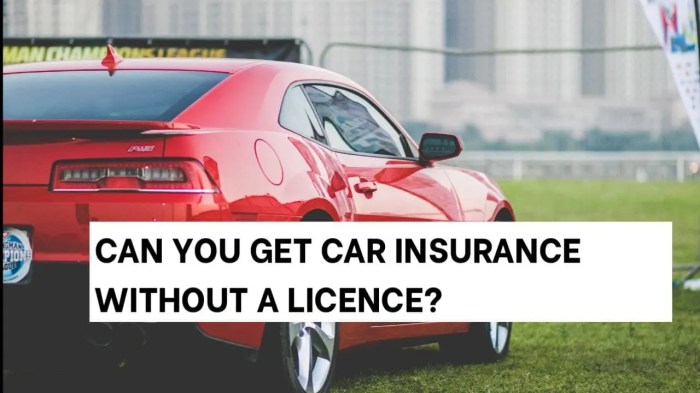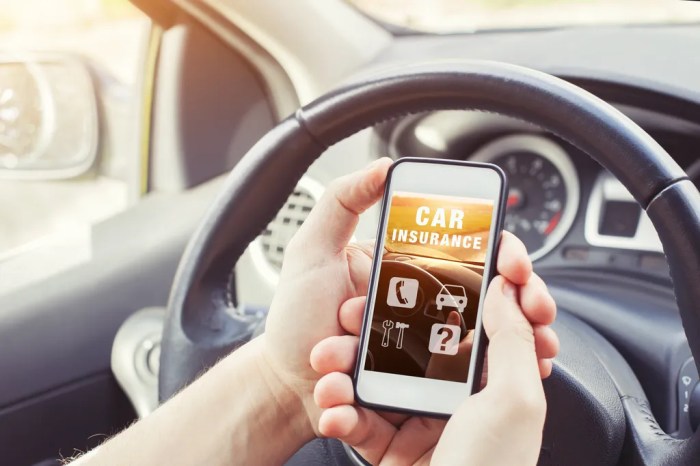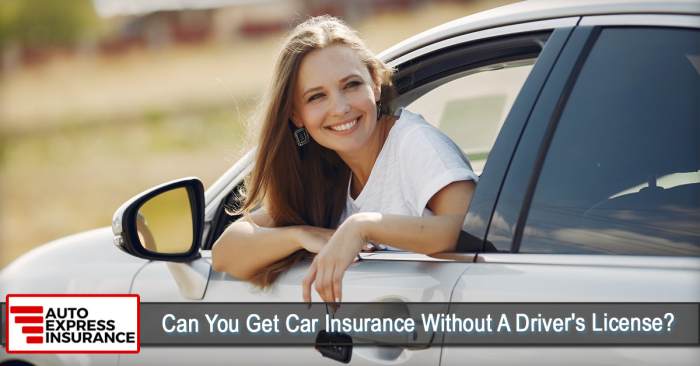
Can you get car insurance without a license in Texas? This question often arises for individuals who are new to driving or who have lost their license due to unforeseen circumstances. Texas law is clear: driving without a license is illegal and can result in hefty fines, points on your driving record, and even jail time. While the state requires all drivers to have a valid license, obtaining car insurance is still possible, though it might come with some limitations.
This guide will delve into the intricacies of Texas car insurance laws, explore the potential for getting insurance without a license, and discuss alternative options available to those who cannot meet traditional insurance requirements.
Texas Law and Licensing Requirements

In Texas, obtaining a driver’s license is a legal requirement for operating a motor vehicle on public roads. The state has specific regulations regarding driver’s licenses, and failing to comply with these regulations can result in serious consequences.
Consequences of Driving Without a License
Driving without a valid driver’s license in Texas is a serious offense. Penalties for this violation can include fines, jail time, and the impoundment of your vehicle.
- Fines: A first offense for driving without a license can result in a fine of up to $200. Subsequent offenses can lead to higher fines, potentially exceeding $500.
- Jail Time: While not always immediate, a judge can impose jail time for repeat offenses or driving without a license while involved in an accident.
- Vehicle Impoundment: If you are caught driving without a license, your vehicle may be impounded. You will be responsible for towing and storage fees to retrieve your vehicle.
- Insurance Complications: Driving without a license can also affect your ability to obtain car insurance. Insurance companies may refuse to cover you, or your premiums may be significantly higher.
Types of Driver’s Licenses
Texas offers several types of driver’s licenses to cater to different needs and age groups.
- Class C Driver’s License: This is the most common type of driver’s license in Texas. It allows you to operate most passenger vehicles, including cars, SUVs, and vans.
- Class A Commercial Driver’s License (CDL): A Class A CDL is required to operate large trucks, such as semi-trailers and buses, with a gross vehicle weight rating (GVWR) of 26,001 pounds or more.
- Class B Commercial Driver’s License (CDL): A Class B CDL is required to operate single vehicles, such as buses, with a GVWR of 26,001 pounds or more, or combination vehicles with a GVWR of 26,001 pounds or more, provided the towed vehicle does not exceed 10,000 pounds.
- Class M Motorcycle License: This license is required to operate motorcycles in Texas.
Learner’s Permit
A learner’s permit allows individuals under the age of 18 to practice driving under the supervision of a licensed driver. To obtain a learner’s permit in Texas, you must:
- Be at least 15 years old.
- Pass a written exam on Texas traffic laws.
- Provide proof of identity and residency.
- Have a parent or legal guardian sign a consent form.
Car Insurance Requirements in Texas
Texas law mandates that all drivers must have car insurance to operate a vehicle legally on public roads. This ensures financial protection for drivers and others involved in accidents.
Types of Car Insurance Coverage
Car insurance policies in Texas typically include various coverage options. Understanding these options helps drivers make informed decisions about their insurance needs.
- Liability Coverage: This covers damages to other people’s property or injuries sustained by others in an accident caused by the insured driver. It is the most common type of car insurance and is required by law in Texas.
- Collision Coverage: This protects the insured driver’s vehicle against damage resulting from a collision with another vehicle or object. It covers repairs or replacement costs, minus any deductible.
- Comprehensive Coverage: This covers damage to the insured driver’s vehicle from events other than collisions, such as theft, vandalism, or natural disasters. It also includes a deductible.
- Medical Payments Coverage (Med Pay): This covers medical expenses for the insured driver and passengers in their vehicle, regardless of who caused the accident. It provides additional protection beyond health insurance.
- Uninsured/Underinsured Motorist Coverage (UM/UIM): This protects the insured driver and passengers in case of an accident with an uninsured or underinsured driver. It covers damages and injuries not fully covered by the at-fault driver’s insurance.
Minimum Liability Limits
Texas law requires drivers to maintain minimum liability limits for car insurance. These limits represent the maximum amount an insurance company will pay for damages or injuries caused by the insured driver.
The minimum liability limits in Texas are:
- Bodily Injury Liability: $30,000 per person, $60,000 per accident
- Property Damage Liability: $25,000 per accident
Consequences of Driving Without Insurance, Can you get car insurance without a license in texas
Driving without car insurance in Texas is a serious offense. Consequences can include:
- Fines: Drivers caught without insurance face hefty fines, ranging from $175 to $350 for the first offense. Subsequent offenses carry even higher penalties.
- License Suspension: Repeated offenses can lead to license suspension, making it impossible to legally drive.
- Jail Time: In some cases, driving without insurance can result in jail time, especially if the driver is involved in an accident causing injuries or significant property damage.
- Financial Responsibility: If a driver without insurance causes an accident, they are personally liable for all damages and injuries, potentially facing significant financial burdens.
Obtaining Car Insurance Without a License

In Texas, it’s generally not possible to obtain car insurance without a driver’s license. Insurance companies need to verify that you’re legally authorized to drive before they can provide coverage. This is because driving without a license is illegal and carries significant penalties.
Challenges and Limitations
Obtaining car insurance without a driver’s license in Texas presents several challenges:
- Legal Requirements: Texas law mandates that all drivers must possess a valid driver’s license. Insurance companies adhere to these regulations, making it difficult to secure coverage without proof of legal driving status.
- Risk Assessment: Insurance companies assess risk based on various factors, including driving history and license status. Without a license, it’s challenging to demonstrate a safe driving record, leading to higher premiums or denial of coverage.
- Limited Options: While some insurance companies might offer limited coverage, such as liability insurance, without a license, the options are significantly reduced. Full coverage, including collision and comprehensive, is unlikely to be available.
Requirements and Procedures
While it’s challenging to obtain car insurance without a license, there are certain circumstances where limited coverage might be considered:
- Proof of Financial Responsibility: Some insurance companies may offer liability insurance to demonstrate financial responsibility, even without a driver’s license. This is usually required for vehicle registration purposes.
- Named Non-Owner Coverage: If you’re not the owner of the vehicle, you might be able to obtain named non-owner coverage. This provides liability insurance if you drive someone else’s car.
- Proof of Financial Responsibility: If you have a valid driver’s license in another state, you might be able to obtain insurance in Texas based on your out-of-state license. However, this may be subject to specific requirements and restrictions.
Alternatives to Traditional Car Insurance
If you don’t have a driver’s license in Texas, you may not be able to obtain traditional car insurance. However, there are alternative insurance options that can provide you with some protection, even without a license.
Alternative Insurance Options
Alternative insurance options are designed for individuals who may not qualify for traditional car insurance due to various factors, including lack of a driver’s license. These options provide limited coverage and are generally less comprehensive than traditional policies.
Non-Owner Car Insurance
Non-owner car insurance is a type of insurance that covers you while driving someone else’s car. This is an excellent option for individuals who frequently borrow cars but don’t own a vehicle themselves.
Ride-Sharing Insurance
Ride-sharing companies like Uber and Lyft provide insurance coverage to their drivers while they are actively engaged in ride-sharing activities. This coverage is typically more comprehensive than non-owner car insurance, but it only applies when the driver is using the ride-sharing app.
Liability Coverage
Liability coverage is a type of insurance that covers you for damages or injuries you cause to others in an accident. This coverage is generally more affordable than comprehensive or collision coverage, and it can be a good option for individuals who are only driving occasionally.
Advantages and Disadvantages of Alternative Insurance Options
Alternative insurance options offer advantages and disadvantages that must be carefully considered.
Advantages
- Lower premiums: Alternative insurance options typically have lower premiums than traditional car insurance policies.
- Flexible coverage: These options offer flexibility in coverage, allowing you to customize your policy to meet your specific needs.
- Access to coverage: Alternative insurance options provide access to coverage for individuals who may not qualify for traditional car insurance.
Disadvantages
- Limited coverage: Alternative insurance options typically have limited coverage compared to traditional car insurance policies.
- Exclusions: These options may have exclusions that limit coverage in certain situations, such as when you are driving a car you own.
- Higher deductibles: Alternative insurance options often have higher deductibles, which means you will have to pay more out of pocket if you need to file a claim.
Eligibility Criteria and Coverage Limitations
Eligibility criteria and coverage limitations vary depending on the specific insurance option.
Non-Owner Car Insurance
- Eligibility: You must be a licensed driver in the state where you are applying for insurance. However, you may not be required to have a license in the state where you are driving the car.
- Coverage: Non-owner car insurance typically covers liability, medical payments, and uninsured motorist coverage.
Ride-Sharing Insurance
- Eligibility: You must be a registered driver with a ride-sharing company and meet their eligibility requirements, which may include a minimum age, a clean driving record, and a valid driver’s license.
- Coverage: Ride-sharing insurance typically covers liability, collision, and comprehensive coverage while you are actively engaged in ride-sharing activities.
Liability Coverage
- Eligibility: You must be a licensed driver in the state where you are applying for insurance. However, you may not be required to have a license in the state where you are driving the car.
- Coverage: Liability coverage only covers damages or injuries you cause to others in an accident. It does not cover damage to your own vehicle.
Comparison of Alternative Insurance Options
| Insurance Option | Eligibility | Coverage | Advantages | Disadvantages |
|---|---|---|---|---|
| Non-Owner Car Insurance | Licensed driver in the state of application, may not require a license in the state of driving | Liability, medical payments, uninsured motorist coverage | Lower premiums, flexible coverage, access to coverage | Limited coverage, exclusions, higher deductibles |
| Ride-Sharing Insurance | Registered driver with a ride-sharing company, meet their eligibility requirements | Liability, collision, comprehensive coverage while actively engaged in ride-sharing activities | Comprehensive coverage, access to coverage for ride-sharing drivers | Limited coverage, only applies during ride-sharing activities, may not be available in all areas |
| Liability Coverage | Licensed driver in the state of application, may not require a license in the state of driving | Liability coverage only | Affordable, access to coverage for occasional drivers | Limited coverage, does not cover damage to your own vehicle |
Important Considerations
While obtaining car insurance without a driver’s license in Texas might seem like a viable option, it’s crucial to understand the potential risks and liabilities involved. Driving without a license is illegal and can lead to serious consequences, including hefty fines, license suspension, and even jail time.
It’s essential to prioritize safety and responsible driving practices. Obtaining a driver’s license is a fundamental requirement for operating a vehicle, and it demonstrates your commitment to safe driving and adherence to Texas traffic laws.
Potential Risks and Liabilities
Driving without a license in Texas carries significant risks and potential liabilities. You may face legal consequences and financial burdens, which could impact your life significantly.
- Fines and Penalties: Driving without a license is a serious offense in Texas, and you can expect substantial fines and penalties.
- License Suspension: You may face license suspension, making it impossible to legally operate a vehicle for a specific period.
- Jail Time: In certain circumstances, driving without a license could result in jail time, depending on the severity of the offense and your driving history.
- Insurance Coverage: Even if you have car insurance, driving without a license could invalidate your coverage in the event of an accident. This means you might be held financially responsible for any damages or injuries caused.
- Increased Insurance Premiums: If you obtain a license after driving without one, your insurance premiums might be higher due to the risk associated with your driving history.
Seeking Legal Advice
If you are facing a situation involving driving without a license, it’s highly recommended to seek legal advice from a qualified attorney. A lawyer can provide guidance on your specific circumstances, potential legal ramifications, and possible options for resolving the issue.
Always prioritize safety and responsible driving practices. Obtaining a driver’s license is a crucial step in ensuring you are legally and ethically prepared to operate a vehicle.
Conclusion: Can You Get Car Insurance Without A License In Texas

Navigating the complexities of car insurance in Texas can be challenging, especially for those without a driver’s license. While obtaining insurance without a license might be possible, it’s crucial to understand the legal implications and potential limitations. Remember, prioritizing safety and responsible driving practices should always be paramount. Consulting with qualified professionals for personalized advice and ensuring compliance with Texas traffic laws are essential steps towards a safe and legal driving experience.
Essential Questionnaire
Can I drive a car in Texas without a license?
No, driving without a valid driver’s license in Texas is illegal and carries serious consequences.
What if I have a learner’s permit? Can I get car insurance?
Yes, you can usually get car insurance with a learner’s permit. However, you may need to have a licensed driver listed as the primary driver on the policy.
What are the minimum car insurance requirements in Texas?
Texas requires all drivers to have liability insurance, which includes bodily injury liability, property damage liability, and uninsured/underinsured motorist coverage.
Can I get car insurance without a Social Security number?
It might be more challenging to obtain car insurance without a Social Security number, but some insurance companies may still offer coverage. You may need to provide alternative forms of identification.




